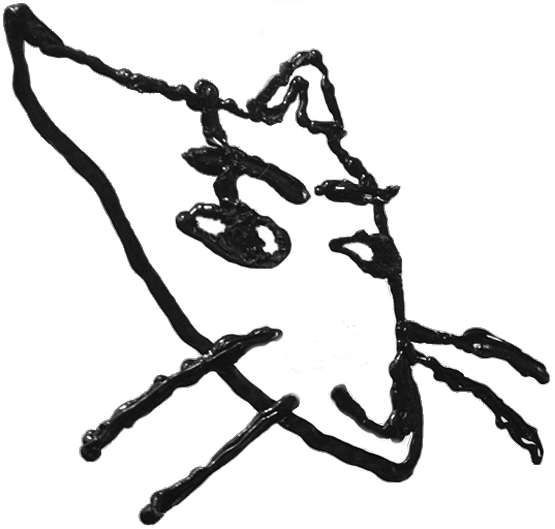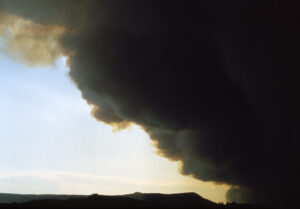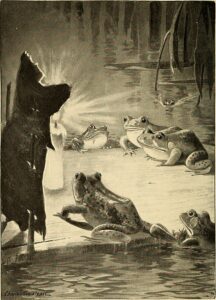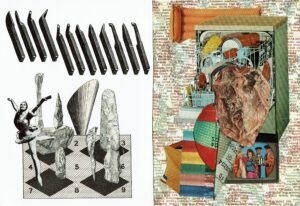Later on, she thought, it was strange how vaporous the most important details of May 19 remained. She would have guessed that the car engine’s low oil level, their failure to properly diagnose the issue, and the eventual and ungrateful breakdown of said engine in Shoshoni, Wyoming, would be vivid memories, in the same category of personal-historical verisimilitude as the deaths of beloved dogs.
Instead, each episode in the chain of events that led up to the drive back to Casper was represented by nothing more than a few stray impressions. Shoshoni’s desiccated rodeo arena. An eighteen-wheeler, cab Tyrian purple, rolling through as they were stopped on the shoulder of the interstate. Tom and his shop assistant conferring by the open hood with an air of indifference. This was the pitiful internal scaffolding of a story that she and Jake had learned, with words only, to tell to others.
It was the arrival of the tow truck driver that returned a sense of peculiar unity to her recollections of that day.
The object of their gratitude wore a navy trucker cap and a cotton flannel — its long sleeves were, despite the wind, seasonally inappropriate. The man’s thin legs bore the airy ripples of his ill-fitting jeans with ease; he bounded back and forth as he winched the car, wheels turned all the way to one side, up on the bed of the Tripod Towing truck. He wore nondescript shoes and wrap-around sunglasses. She found it hard to believe there were eyes behind the lenses, or even limbs beneath the clothes, and imagined his movements accompanied by a skeletal rattling.
As they got in — Jake in the front, her in the back seat — the driver asked how they’d pay once they were back in Casper. In cash, they said, though they’d have to stop by an ATM.
“That’s fine,” he said, starting up the truck. “We can’t go faster than 60 an hour, or the whole truck starts shaking. So we’ll be in the city in about an hour and a half.”
It was the third day of their road trip, and already the two of them were traveling in the wrong direction. They wouldn’t get very far in the three weeks they had left, probably not past Spokane, if this was their rate of progress. Visions of total engine abdication in apple-picking country, dutiful excursions to craft cideries.
The grass near the highway was replaced further back by low saltbushes with a grayish-white color, as if the plants, previously vibrant, had been caught in the wan soil and absorbed its lifeless qualities. Or been woven up by some malign spider. They stretched back before disappearing into the landscape’s hazy emendations, a horizon of mesas and hills.
She imagined an observer on one of these clifftops, faithful and inquisitive gaze directed at the tarmac bisecting a lifeless desert. Would it look to him as if the car was making progress toward a destination? Or would it seem instead to be stuck in a loop, cycling through somnolent animals, clots of dark buildings, and the inert landscape among and between? There would be no suggestion, from the vantage point of this local outcropping, that a city, a dry lakebed, any change at all, might exist out of sight in some far east. The observer, permitted to fall back into his mesmeric boredom, must breathe a sigh of relief when the crawling, intruding cars disappeared from view again.
After fifteen minutes of silence, the driver produced a pack of American Spirits. Asking if they minded, he rolled the window down a hairsbreadth. The smoke entered her nostrils and perched on her tongue, duly proceeding lungward, while the rumble of the road became louder. The driver began to speak — it was barely audible, but the nicotine entering her bloodstream made her more alert, and she leaned forward.
“Moneta, 18 miles. Deer Creek, 36 miles. Hiland, 57 miles. Then Pytho, then Casper. The distance from Shoshoni to Moneta always seems longer than the distance from Moneta to Deer Creek, but I measure it out on the odometer and they’re the same.”
The number of cattle and sheep increased in the areas between the small towns they drove through, which the driver called out as they approached them — Natrona, Powder River. She couldn’t make out any visible hierarchies among the ruminants; they seemed to collectively agree to stay as far from the settlements of their owners as possible.
The next cigarette made the driver even more talkative. He detailed the mileage and drive times between the various cities, towns and settlements in central Wyoming, gradually expanding his report to include the rest of the state and region. Boulder took an easy four hours unless you hit traffic, while Billings was an unpredictable ride in the winter wind and snow.
Whenever he paused, he picked up his bottle of Pepsi and took a sip. She hadn’t had anything to drink since the coffee at the diner early that morning; she thought at first that he had sensed this and was handing the bottle to her. The idea of drinking the soda, which must already have been warm and flat after the 40-minute trip from Riverton to Shoshoni, repulsed her. But it was also the real thing, an obsidian sugar shock, the result of thousands of days in laboratories and boardrooms spent examining mechanisms of incorporation and desire, how to knit them into the impulse now surging up inside her.
From Jake: “Can I have a little of that Pepsi?”
“It’s the only one I have, man, and I’ve gotta drive back to Riverton after this. That’s 125 miles to get from the dealership to the office. That’s more than 2 hours in this truck. Let me have a little company.”
“Are you from around here? You know the area pretty well.”
Jake’s question came in a flat, neutral tone, the same one he’d use to ask about her day, her sleep debt, and, too frequently for her liking, the state of her soul.
“No, I’m from Colorado, grew up there. My dad was a master mechanic. I moved to Cheyenne about 15 years ago after I lost a court case.”
He paused for a few seconds without lighting another cigarette.
“I had to come serve 5 years of probation inside city limits. They said I inappropriately touched a woman.”
Jake (flatly, neutrally): “Did you do it?”
“I didn’t, no. I was framed.”
Her senses were now unpleasantly acute. She imagined the cliffside observer yearning for a return to tranquility.
“I used to be a long-haul trucker. During the summer, my kids would come with me on trips. My son met Tom Selleck one time when I moved his furniture. Signed an autograph, even if the kid cared more about the Rockies game on the radio. This was back when they were a crap expansion team. Makes it even more embarrassing.
“During the school year I’d usually have a trainee with me in the cab. They’d ride around with me for a couple of months on trips and get to spend some time behind the wheel.
“One guy was narcoleptic, at least when it came to trucks, just always falling asleep, I don’t know if it was something about the vibrations or the rhythm of the road or what but he couldn’t go more than five minutes in the cab without nodding off.
“Truckers these days can’t drive for shit, they’ve got no sense for how to handle themselves or other cars on the road. But I cared about safety and all that stuff and I told the company I was working for that this fucking guy couldn’t drive a truck and I didn’t want him with me any more.”
Jake emitted a stream of absorbed grunts as the story went on. While the driver spoke, they had made progress toward Casper, and a riverine line of cars now appeared behind the trailer of the slow-moving truck. There were no passing lanes around here, and she caught a glimpse of the red-faced driver directly in their wake. Maybe he, too, worried that this landscape would continue on forever with no respite, and this was what lent extra force to the animated gestures he was now deploying, his mute and futile attempts at conducting them forward.
But there was a break to the north — the slopes, seams, holes and folds of Hells Half Acre. Earlier that day, she and Jake had stopped there briefly before their troubles began, skimmed the interpretive signs: eroded by wind and water over millions of years; largest badlands in the Wyoming Basin; buffalo jump for the Arapaho, hence the bones still interred in the soil. After large sections of the park were closed to prevent tourists following after the bison, it had declined as an attraction, taking with it a hilltop restaurant and a roadside motel.
The park had seemed like a more provincial version of the stops on their planned itinerary, or maybe natural wonders dulled easily. Knuckle-headed human folly did not dull easily. The final placard recounted the story of a blithe pioneer, a greenhorn Pony Expresser who descended from his mustang and ventured into the caves at the center of the siltstone and clay formations. Stumbling through the batwing doors of the next town’s bar that evening, he only remembered subterranean fumes with their sweet, sharp smell, followed by a one-sided conversation with his horse for the next few hours. It came to an end when the mustang finally replied, advising him to hop on and depart immediately for other pastures, greener or not.
The sign played the whole episode off as light comedy, but could the two of them have been exposed to some toxic gas during the brief stop-off, or perhaps it had accumulated in the driver’s bloodstream after years of towing cars between Riverton and Casper. How else to explain his babbling?
“They transferred him to another truck and I thought that was the end of it. But a couple of weeks later they were driving out of Olympia one night and the trainee took over from the driver. Well, he fell asleep and drove the truck into a river.
“They were both alright but the cargo was lost and the company fired the trainee. He sued for wrongful termination and the case went to court. The company called me to testify. I said what I said — that the guy couldn’t go more than five minutes in the truck before his eyes went shut. Well, he lost the case.”
While the driver spoke, he was statuesque, immune to the sun bearing down on them through the back windshield. She could see beads of sweat forming around Jake’s neck, on the red skin just outside the shadow of the ear lobe. The driver showed no signs of exertion — it was only his tone that changed.
“I don’t know if my testimony lost it for him but he thought so. Well, a few months later the trainee’s fiancée said that I assaulted her when I was passing through Cheyenne. It didn’t matter that my log books showed I wasn’t in town when she said I was. The prosecutor said that she could always change her story to match the dates.
“The judge told me that if I entered a guilty plea I could get away with five years of probation — otherwise I’d be looking at the same time in prison. Well, I took him up on it and I moved to Cheyenne with my family. Once the five years were up, I didn’t see any reason to go back to Colorado.”
Sloping green hills, a friendlier topography, immersed them once the tow truck reached the outskirts of Casper. At the I-25 junction, she saw the bronze statue from that morning welcoming visitors to “Oil City.” It consisted of four muscly rig workers, jaws unnaturally square, installing a well. She remembered the men wandering around the Casper Walmart, where they had stopped for supplies, and imagined them now crawling like emmets over the alien shrubs, working the land over for oil and gas. The image gave her a sense of guilty relief. As they pulled into the Wells Fargo parking lot, she felt overwhelmed by her desire for a soda.
The mechanic from Subaru told them in a low voice that it would take two to three weeks to get the parts for a new small-block engine. His hands, methodically wiping themselves again and again on a terrycloth rag, underscored his authority. The price from Hertz wasn’t too bad. They’d just come back to Casper in a couple of weeks and pick the car up.
In the hotel room that night, Jake told her that he had found the tow truck driver’s account of his case dissatisfying, that he suspected some crucial details must have been omitted. “There’s no way it’s all true,” he repeated. But something about the ride, he added, made him suspend his judgment, and he even found it a little exhilarating. Still, why did the driver say anything at all?
While Jake spoke, she was reading about gas leaks a few years ago at an elementary school in Midwest, a small city north of Casper. The students and teachers had correctly identified the sweet, aromatic odor as benzene seeping in from nearby oil fields. A paper from an Italian researcher suggested that the oracle at Delphi might have been exposed to high levels of the same chemical before her voice, deepening in despair, began prophesying. There was a now-depleted oil patch in Hells Half Acre that had heated Powder River, one of the towns their driver had pointed out. She did not float any theories to Jake, who was already asleep, not even during the next day’s drive when they again passed the badlands and made it past Shoshoni in a rental.
There was a traffic jam — construction in one of the tunnels dynamited through the rock — at the end of the desert, where the plains were replaced by foothills and the Wind River, coursing at the base of a steep embankment toward an invisible valley. They sat for a long time. She took off her shoes and rolled the socks up and down her legs, feet on the dashboard. Did the buffalo, shunted off the cliffside as one lowing mass, ever suspect how much worse it would get for their descendants?
“I don’t know — I guess everyone gets loopy after being back there for so long,” said Jake. “All that flat space…it’s nothing to sneeze at.”
Watching his hands fiddle with the wheel, it occurred to her he might actually be talking about himself. She imagined a wrench after a heavy foot pressed down on the accelerator, a stomach flip in empty air as the car headed for the river. Then at least they’d be moving forward, and at speed, past the blurred riparian land. Impressions coming and going, lodgings to chew them over unavailable — bid a fond farewell to premonitions and omens ill or benevolent. Let the car rust in Oil City.




